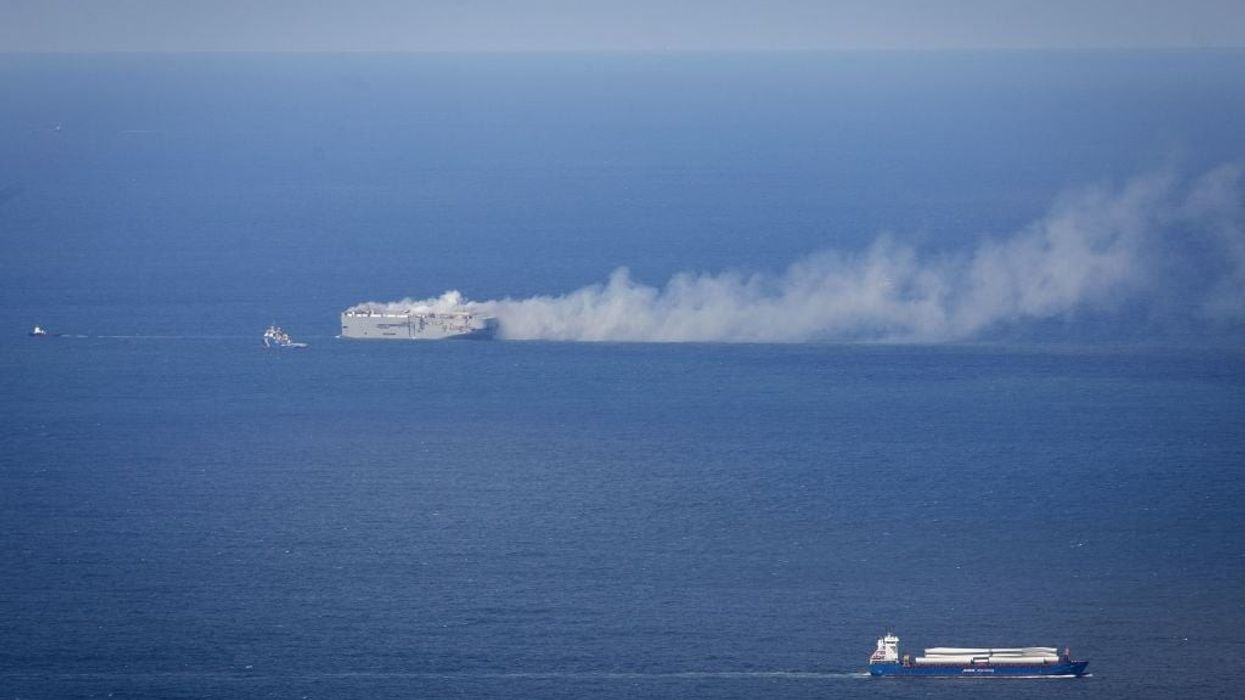AUTHORITIES were racing on Thursday (27) to prevent a possible ecological disaster off the Dutch coast where a blaze raged aboard a car carrier ship for a second day.
The Fremantle Highway, a Panamanian-flagged vessel, remained tethered to a salvage ship but was drifting westwards following a fire that broke out on board late on Tuesday (26).
"The fire is still burning and there is still a lot of smoke," the Dutch coastguard said in its latest update, adding that the vessel was drifting westward in the wind and current.
"But the intensity of the fire seems to have diminished compared with yesterday."
The Fremantle Highway was "now 16 kilometres off the island of Terschelling," it said, adding: "The vessel is currently kept outside the traffic lanes, so that shipping traffic can pass at a safe distance".
"The temperature on board remains very high and putting out the fire is difficult," coastguard spokesman Edwin Granneman said.
Firefighting vessels have had to stop spraying the ship to cool it down "in order to prevent too much water coming on board" as it affected the ship's stability, the coastguard said.
"Earlier the ship was continuously cooled, but the blaze was more intense," they said.
Electric cars
One sailor died after he and 22 others - all from India - were rescued from the burning ship, carrying around 3,000 vehicles, and forcing some crew members to jump overboard.
The blaze erupted shortly before midnight on Tuesday.
Meanwhile, the Dutch Safety Board (OVV) - which probes accidents and disasters in the Netherlands - said it will assist in the investigation into the on-board fire.
"Panamanian authorities are in charge of the probe, as the ship is registered there," the OVV posted online.
"The Board will specifically look at the role of the crew" during the disaster, it said.
Shoei Kisen Kaisha, the ship's owners, have said there was a "good chance that the fire started with electric cars", but added that the cause still needs to be investigated.
'Very concerned'
Officials said the fire could rage "for days", raising the spectre of an ecological disaster on a nearby chain of islands, which include Terschelling and Ameland, where the fire was first reported.
Several ships were on the scene, including the emergency tug boat Guardian "where a salvaging team is on board, monitoring the situation and planning an operation", the coastguard said.
Outgoing Dutch infrastructure minister Mark Harbers said should the Fremantle Highway spring a fuel leak, it could drift away from the Wadden Sea islands into the North Sea.
"This is due to the currently expected wave and wind direction," Harbers said.
The ship remained close to Terschelling and Ameland, which are part of an archipelago of ecologically sensitive islands in the Wadden Sea.
The area spanning the Netherlands, Germany and Denmark has been declared a UNESCO World Heritage Site and has a rich diversity of more than 10,000 aquatic and terrestrial species.
"The risk of an environmental disaster is always present," Granneman told BNR news radio. "You have to take into account a scenario in which the ship capsizes or sinks."
"It seems that the situation on the ship has stabilised somewhat," said Heidi Bunicich, spokeswoman for the Ameland municipality.
"But of course we are very concerned. We have emergency plans in place to deal with various scenarios," she said.
The Fremantle Highway is an 18,500-tonne vessel and was sailing between Bremerhaven in Germany and Port Said in Egypt before its final destination in Singapore.
Some 340 containers tumbled off one of the world's largest container ships after a storm in the same area in early 2019, littering kilometres of pristine coastline with plastic and polystyrene.
Fires on car-carrying ships were increasingly the source of major losses, insurers said.
Last year, the Felicity Ace sank off the coast of the Azores in the Atlantic Ocean with some 4,000 vehicles from German car maker Volkswagen on board.
(AFP)




